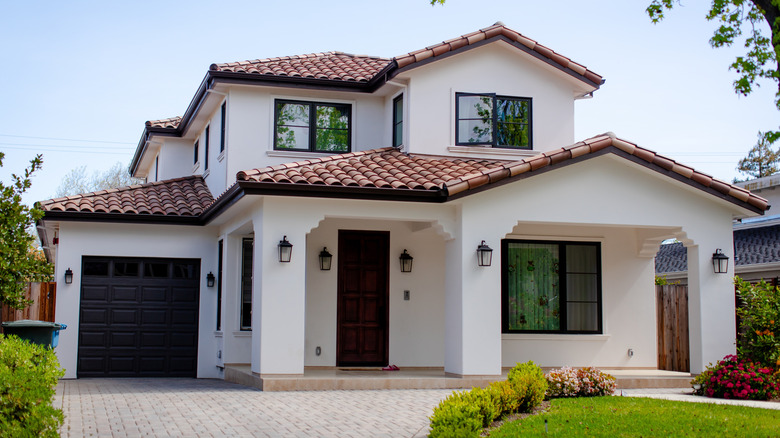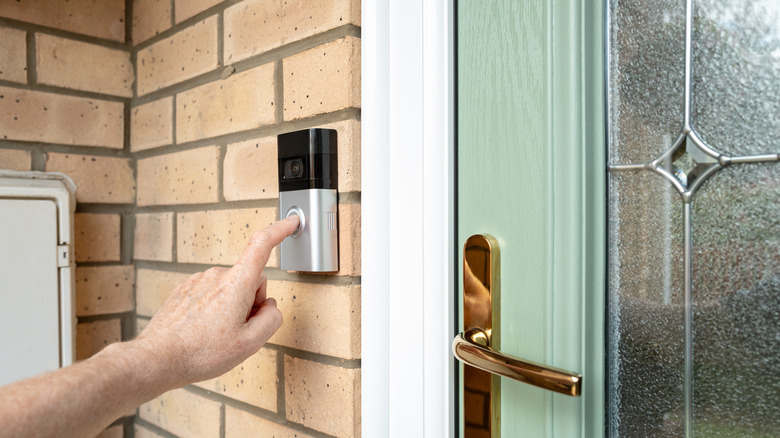The Sneaky Home Device That Could Be Stealing Your Data
Everyone wants to feel safe in their own home. From locks on doors to classic alarm systems to surveillance cameras, there are plenty of ways to protect one's home and self while they are in it. Whether you are moving to a new house or trying to feel more secure in your current one, it helps to know how to choose the best security system for your home, and one important, but often overlooked, part of making this decision is determining the risks of each system. For example, smart home device security systems are potentially more effective than traditional security systems, but there are concerns about the data they collect, especially from front door cameras.
Smart home security systems with video cameras that detect motion and record when a person approaches have become increasingly popular. If you are truly concerned about safety and privacy, though, you likely have concerns about how the companies behind these systems store and use the data that their cameras collect. Depending on your desired level of privacy, these devices may not be a good choice for you, as they record you, not just the activity of strangers. If you are worried about what information your front door camera device may be stealing, then it is important to gain a better understanding of what data is collected and how it is used. From there, you can figure out what you can do about it and if you should be concerned.
What data is collected by home security systems?
Many of these smart front door cameras work by connecting to Wi-Fi and allowing users to view livestreams and previously recorded videos that usually begin when the camera detects motion. Many also record sound, and some even allow users to speak through the camera. Your recordings can be used beyond your connected devices, though, which is where privacy may become a concern for you.
Video and audio recordings, timestamps, device locations, network information, and environmental conditions can all be collected, depending on the company. These outdoor smart cameras collect significantly more user data points than other smart home devices. The popular company Ring, for example, states that they collect the geolocation of your mobile device and certain Ring devices if you consent, and they also collect video and audio recordings, live video and audio streams, images, comments, and environmental data captured by their devices. They also collect contact and account information.
According to Ring, this data is used to provide personalized services, manage and authenticate profiles, perform analytics, improve the company, and more. Overall, the data collection is meant to give users a better experience, but it also means that your important private data is neatly stored in a potentially risky way. Ring also states that it may share data with its affiliates and subsidiaries, service providers, and business partners and if required by law or deemed required to prevent harm or financial loss. Along with the risks of intentional sharing, there is also the potential for cyberattacks, which could cause a data breach that puts your information into the hands of a hacker.
Should you be concerned about data stealing?
Even if you are comfortable with a company having this personal data, there are concerns about the safety of your personal information during events like cyberattacks and data breaches. Without regulations and standards for each company to follow, the truth about using smart home devices is that trusting these companies with your data can be risky. Not having a strong enough password or connecting to an unsecure network can also lead to security issues at the individual level, potentially allowing bad actors to access your information. Ultimately, when smart devices collect your data, there will always be a potential risk. You will need to weigh this with the benefits of using a smart system.
If a smart home security system is still appealing to you, there are some things you can do to minimize risk. First, you should choose a trustworthy, well-established company. Look into their privacy practices, such as what data they collect, who they share your data with, and how it is stored. Systems like end-to-end encryption can help protect your data better than standard encryption. Always use strong passwords and two-factor authentication when available, and always keep your smart camera current by doing the latest updates immediately. These tips are also helpful when attempting to ensure your keyless door lock is secure. Finally, if you realized too late that these companies were taking your data, there are some states in which you have the right to tell the companies to delete your data, which can give you more control over your personal information that's out there for others to access.


